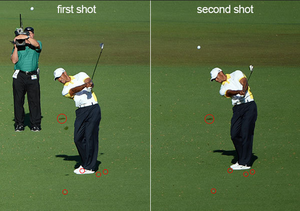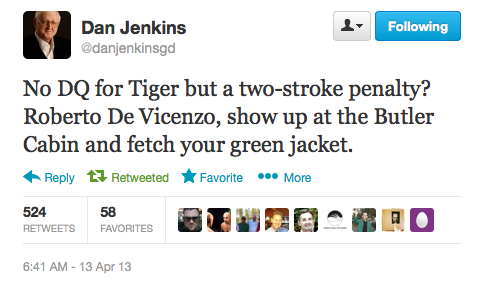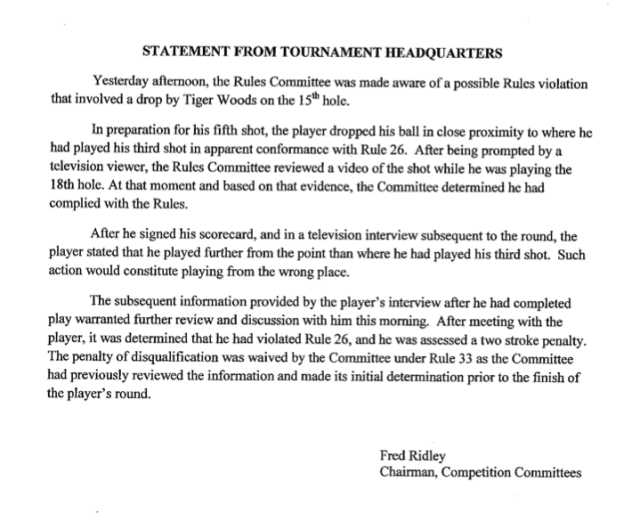When you come to think of it that is the secret of most of the great holes all over the world. They all have some kind of a twist. C.B. MACDONALD
The Lone Camerman Theory: Final Bit Of Tiger Drop Irony
/Has Hot Seat Finally Shifted From Tiger To Ridley?
/Kevin Ferrie takes the analysis of the Tiger drop incident at Augusta a bit far in quoting Neil Hampton, GM of Royal Dornoch, who says...
"We are trying to encourage more juniors to play our game and one of the most important things we address is the ethics involved: how to treat your fellow man, and doing so with integrity. We're looking to put great people out into the world through golf, so this is sending the wrong message to the youngsters," he said.
"We are trying to get them to police themselves but now they can look at that and say, 'if Tiger can do it, so can I'.
"He has been given a chance to stay in the tournament by people who have selfish reasons for wanting him to stay in: because it is good for their viewing figures or whatever. However, having realised that he made a mistake, Tiger should have withdrawn from the tournament."
This was my initial reaction, but as we've learned what happened, it's clear the committee made the right move and set a bold precedent in an effort to remedy its mistake. Fred Ridley was not acting out of concern for the tournament so much as for his job as competitions chair (and a possible future club chairmanship).
Considering how badly Ridley missed the opportunity to take the viewer's call seriously enough to call Tiger in for a pre-scorecard signing, the 33-7 remedy was a pretty good save. Yet it's clear as time passes that Ridley's competence will continue to be questioned because of this incident.
Based on your reading of the situation and talking to other golfers, is it fair to say the ire/blame/annoyance at the entire episode has shifted from Tiger to Ridley?
Golf World Feature: "Behind Closed Doors."
/In his latest blog post, PGA of America President Ted Bishop writes that watching Adam Scott win "was probably as painful as swallowing a handful of nails for USGA and R&A officials."
 The increasingly confrontational tone between Bishop's PGA and Peter Dawson's R&A is just one of the many topics covered in my Golf World feature from Augusta, posted on GolfDigest.com.
The increasingly confrontational tone between Bishop's PGA and Peter Dawson's R&A is just one of the many topics covered in my Golf World feature from Augusta, posted on GolfDigest.com.
The centerpiece topic, of course, is the Woods ruling and the handling by Fred Ridley as yet another recent black eye for casual observers of the Rules.
One More Attempt To Clarify 33-7 v. 33-7/4.5
/Tiger Woods was penalized two strokes for violating Rule 26-1a and/or 20-7c yet avoided disqualification under Rule 6-6d or 33-7/4.5, instead he was absolved under an obscure, maybe unprecedented use of 33-7.
Got that? I understand the confusion over Tiger's penalty and non-WD. I misunderstood it initially because the first reports, by Tom Rinaldi (ESPN) and Steve Sands (Golf Channel) mentioned 33-7 and the recent rule change involving HD video, which was the 33-7/4.5 Decision not invoked in this case.
I understand the confusion over Tiger's penalty and non-WD. I misunderstood it initially because the first reports, by Tom Rinaldi (ESPN) and Steve Sands (Golf Channel) mentioned 33-7 and the recent rule change involving HD video, which was the 33-7/4.5 Decision not invoked in this case.
I tried clarifying it in Golf World Daily, have written about the episode in this week's Golf World, posted this Barry Rhodes item on the matter, but for now, just read John Morrissett's Facebook post on the Erin Hills website if you still aren't sure why Tiger avoided disqualification.
The key graphs:
While this seems like a complicated set of facts, the ruling becomes straightforward when it is boiled down to its basic elements: On Friday the Committee made an incorrect ruling (of no penalty), and on Saturday the Committee corrected that incorrect ruling. The key is that, before Tiger returned his score card on Friday, the Committee had reviewed the incident on 15 and made the ruling of no breach. (Even though the Committee did not tell Tiger of this ruling, it was still a ruling.) On reflection, the Committee realized it made an incorrect ruling and corrected that ruling on Saturday (with ample authority and precedent to do so).
If the Committee had not become aware of the incident and had not made a ruling before Tiger returned his score card on Friday, then it would have been a straightforward disqualification. It is interesting to note, therefore, that the timely telephone call actually prevented Tiger from being disqualified.
Two Follow-Ups To The Woods Drop Controversy
/The Tiger Woods 15th hole drop story went a couple of directions Sunday.
In the case of this appropriately measured Barry Rhodes blog post sent in by another member of the rules community, you're seeing how the experts on these matters are reacting to Fred Ridley's invocation of Rule 33-7 to resolve the situation.
So, to be absolutely clear, the Committee waived the penalty of disqualification, because they considered that this was an exceptional individual case where such a penalty would have been too harsh. I am not aware of any other situation where a player who did not know a Rule of Golf (or if they did, they forgot about it) has been favourably treated in this way. I am therefore surprised at the ruling and believe that it may have adverse consequences in the future in similar situations.

 In the conspiracy theory with just enough validity department, Augusta Chronicle photographer Michael Holahan's images today were analyzed in this unbylined wire story which suggests that Woods was
In the conspiracy theory with just enough validity department, Augusta Chronicle photographer Michael Holahan's images today were analyzed in this unbylined wire story which suggests that Woods was
While the photos may not be conclusive evidence and they will no doubt be picked apart, Tiger does appear to be standing within inches of where he took his first shot, not the two yards that he himself thought he had moved.
Holahan maintained his location for both shots, offering a clear comparison. Television replays, on the other hand, came from different locations as an ESPN cameraman on the course set up in slightly different locations.
The photo comparison prompted more questions of Woods about the drop after his final round 70 left him four shots out of the playoff.
Q. Is there any chance that you were mistaken when you said you were two yards back, because there were photos that looked like you were in the exact same spot?
TIGER WOODS: No, I saw the photos.
Q. What do you think?
TIGER WOODS: I was behind it.
Q. You do?
TIGER WOODS: Yeah.
Q. So you're pretty sure that the two yards is actually ‑‑
TIGER WOODS: One, two yards. But it certainly was not as close as the rule says.
Clippings: Woods Penalty Analysis
/I've written a short Golf World Daily item on this, but right off the bat, I and many others got this part of the Tiger Woods 2-stroke penalty wrong: it was the long held Rule 33-7 which the Masters Committee invoked to absolve Woods of disqualification. NOT, 33-7/4.5, which specifically addressed the HD video call in issue. Even Tiger, talking after the round, did not understand this:
TIGER WOODS: I don't know. Under the rules of golf I can play. I was able to go out there and compete and play. Evidently this is the Harrington rule, I guess. If it was done a year or two ago, whatever, I wouldn't have the opportunity to play. But the rules have changed, and under the rules of golf I was able to play.
The initial Golf Channel and ESPN standups suggested 33-7/4.5, and only after Fred Ridley's press conference and some help from rule aficionados did more understand the distinction. Nick Faldo, critical of Woods on his Golf Channel appearance, backed down on CBS according to Michael Hiestand.
Talking about Woods' two-stroke penalty as a result of a rules violation Friday, Faldo noted golf rules were relatively cut-and-dried in the past -- with players generally disqualified for infractions. Now, he suggested, interpretations are more nuanced. Said Faldo on-air: "We're in a new era, under new rules."
 However, as this Brendan Porath posted video notes, Faldo's contrition in the CBS Butler Cabin opening continued to suggest Woods was a beneficiary of a new rule, when it was an old decision that the committee invoked.
However, as this Brendan Porath posted video notes, Faldo's contrition in the CBS Butler Cabin opening continued to suggest Woods was a beneficiary of a new rule, when it was an old decision that the committee invoked.
Doug Ferguson's story provides a definitive account of the episode and he notes this right off the bat:
In a bizarre twist to a complex case, it was a television viewer’s phone call that ultimately spared the world’s No. 1 player.
Randall Mell denounced the club's actions over the last two days.
A foul odor hung over Augusta National on Friday when Tianlang Guan was penalized one shot for slow play. The club had discretion in the matter, and it decided not to cut the kid a break. Because while Guan clearly was in violation of the tournament’s slow-play policy, it’s difficult to believe he is the first player in 77 years of the Masters to be in violation. The air here freshened a bit when Guan made the cut, becoming the youngest player to make a cut in major championship history.
Now, with Augusta National using its discretion in the Woods ruling by waiving a DQ for signing an incorrect scorecard, this Masters doesn’t smell right again.
 Gene Wojciechowski was also not very kind to Ridley's Rules Committee.
Gene Wojciechowski was also not very kind to Ridley's Rules Committee.
Woods broke a ball-drop rule -- or more correctly, he played from the wrong place after a ball-drop violation. Simple as that. Then the rules committee botched a review of the drop. Simple as that. Then Woods said what he said about the 2 yards.
And then nothing became simple.
My initial gut reaction: He should have been disqualified. If he wasn't DQ'd, he should have withdrawn from the tournament. After all, whether he realized it or not, Woods had broken a rule and had eventually signed an incorrect scorecard.
It would have been the noble thing for Woods to withdraw. I still believe that. But it wouldn't have been the practical -- or correct -- thing to do.
Jeff Rude caught up with good, great or legendary agent Mark Steinberg who says Tiger rose at 7:30 and was at the club by 8 am to explain his non-willful violation.
Cameron Morfit says Tiger can't win this Masters even if he wins this Masters.
Dave Kindred makes several key points in this column, especially this one:
Only in golf are the competitors also the referees. They police themselves and they police others. Many a player would have stopped Woods from the incorrect drop. (By the way, he said that happened because he was "a little ticked" at the misfortune of the first shot kicking back into the water. He also said he "wasn't even really thinking," which is news, considering he'd earlier said he had thought enough to plan the drop two yards back.
In the website poll here, 47% said he should WD, 50% said he should not WD and 3% were unsure.
 In a must read, Dave Shedloski caught up with Dow Finsterwald, member of the Masters Rules Committee and recipient of an eerily similar bit of committee effort to avoid a disqualification.
In a must read, Dave Shedloski caught up with Dow Finsterwald, member of the Masters Rules Committee and recipient of an eerily similar bit of committee effort to avoid a disqualification.
John Morrissett, formerly of the USGA and one of the top rules authorities on the planet, praised the committee's handling and noted this in a Facebook post:
Consider the ramifications if the Committee had disqualified Tiger today. In that case, Tiger would be justified in being furious at the Committee for failing to advise him of the issue yesterday before he returned his score card so that he could have avoided disqualification. Tiger made an error and is penalized two strokes; the Committee's incorrect ruling should not result in further penalty.
Cassie Stein compiles the Tweets of players and dignitaries and they aren't very kind to the committee.
And fnally, the last word goes to the Ancient Twitterer.

**AP's Jim Litke says CBS announcer "Jim Nantz sees the interview Friday night and calls Masters officials. They call Woods on Saturday morning and review video of the shot with him."
Scott Michaux in the Augusta Chronicle with this tough assessment of the day:
In a colossal accumulation of failures by all parties to properly apply the rules of golf regarding Woods’ drop on the 15th hole Friday, the Masters rules committee came up with a hybrid solution that retroactively assessed Woods a two-shot penalty yet kept him in the tournament despite signing an incorrect scorecard.
It is far from a Solomonic compromise and has sparked outrage and debate around the world a day after the tournament docked a 14-year-old amateur a stroke for playing too slowly. Shrieks of favoritism will abound and never go away if Woods rallies from four strokes behind and wins his 15th major.
Instant Poll: Should Tiger Woods Withdraw?
/Some are calling on Tiger Woods to "man up" and withdraw from the Masters for violating the rules of golf.
He tees off at 1:45 ET.
Statement From Masters Tournament Committee On Tiger Penalty
/So they are not invoking the HD Decision, but instead taking some of the blame. So many questions here, but we'll just go with the statement for now:

**Tiger's statement on Twitter:

**ESPN's breakdown of the drop, includes analysis from Azinger, North and Strange.
Faldo, Chamblee Calling On Woods To "Man Up" & WD
/Stunning contrast right now on Golf Channel and ESPN this wacky morning.
Nick Faldo and Brandel Chamblee right now are calling on Tiger Woods to "man up" (Faldo) and that he knows he gained an advantage, knows he broke the rule and has not yet withdrawn "sad" (Chamblee).
Both players made clear they believe he made a mistake, mixed up the rules and did not intentionally cheat.
ESPN meanwhile, with Andy North and Curtis Strange, have been lauding the committee's use of the Decision and that this is why the rule was created. Whether it was created for this reason though, is very much in dispute.
Decision 33-7/4.5 Flashback: "The R&A and the USGA confirm that the disqualification penalty still applies for score card breaches that arise from ignorance of the Rules of Golf."
/You can read the USGA/R&A April 2011 release on the Decision change related to select high definition video driven disqualifiations. But it makes abundantly clear that ignorance of the rules is not included in the Decision invoked by the Masters Committee in issuing Tiger a 2-shot penalty Saturday morning.
This revision to Decision 33-7/4.5 addresses the situation where a player is not aware he has breached a Rule because of facts that he did not know and could not reasonably have discovered prior to returning his score card. Under this revised decision and at the discretion of the Committee, the player still receives the penalty associated with the breach of the underlying Rule, but is not disqualified.
In revising the decision, The R&A and the USGA confirm that the disqualification penalty still applies for score card breaches that arise from ignorance of the Rules of Golf.
The actual wording from the Decision:
A Committee would not be justified under Rule 33-7 in waiving or modifying the disqualification penalty prescribed in Rule 6-6d if the player’s failure to include the penalty stroke(s) was a result of either ignorance of the Rules or of facts that the player could have reasonably discovered prior to signing and returning his score card.












